McDonald DIGITAL
Institute
The Digital Nature
Photo Course
Learn and Master
the Important Concepts of Photography,
with a DIGITAL EDGE!
|
THE
MOST COMPLETE, THOROUGH, AND ENJOYABLE DIGITAL PHOTOGRAPHY COURSE
YOU WILL FIND ANYWHERE! |
Most digital shooters are still
thinking 'film' when they shoot digitally. Consequently,
they are not exploiting the incredible advantages digital photography
has to offer. We'll show you
how to get the most out of your photography by incorporating digital's
full potential!
May 24-30, 2009
June 14-20. 2009
SPECIAL
ARIZONA COURSE -
In 2008 we will again be offering two D-CNPC
courses in Arizona. This locale is perfect for
many of our West Coast students, and, as you'll see in the brochure,
this course also provides
students with a unique opportunity to photograph hummingbirds,
too.
Limited to TEN participants
Price: $1,695 includes ALL Food and Lodging!
Pennsylvania courses
Note: All photos in this on-line brochure were taken by our
June D-CNPC participants. Thanks Marty, Eliot, Ignacio, and Kurt!
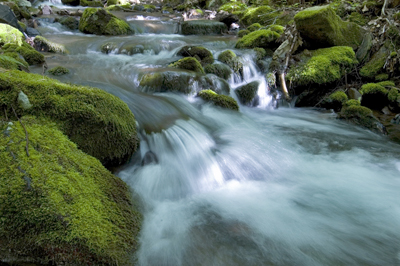 For
the last eighteen years we have been offering THE COMPLETE NATURE
PHOTO COURSE here at Hoot Hollow.
And for the last four years, those courses have been digital-based.
The digital world is upon us and we are excited about the photographic
possibilities this provides.
For
the last eighteen years we have been offering THE COMPLETE NATURE
PHOTO COURSE here at Hoot Hollow.
And for the last four years, those courses have been digital-based.
The digital world is upon us and we are excited about the photographic
possibilities this provides.
The D-CNPC is unique. The course stresses the importance of
sound photographic techniques, emphasizing exposure, composition,
and flash to make THE BEST IMAGES YOU CAN, RIGHT IN THE CAMERA.
However, shooting digital provides a completely unique advantage
-- allowing photographers to combine Photoshop techniques to maximize
their creative and digital potential, and you'll be learning how
this can be done. You'll see photography as you never have before,
developing a competence in your skills while learning exciting
new ways to further your artistic vision.
Limited to 10 participants, with two instructors for all field
sessions, our people enjoy quality, personal care in this fast
paced, challenging week.
SOME OF WHAT YOU WILL LEARN:
|
Master Exposure - Learn how
to make a great exposure and forget all the guesswork! |
Composition - Learn the fine
points of effective compositions - in Class and in our Field
Sessions! |
|
Master TTL Flash - Everything
YOU need to know, including how to balance flash with daylight
as YOU control your lighting. |
Lenses - Know what
they do and how to use your lenses effectively, from powerful
wide-angles to close-ups via macros or telephotos. |
|
Digital Workflow - Make and keep order with your digital files. |
RAW Conversion - Maximize each digital shot and eliminate/reduce
any need for Photoshop! |
|
Image Management - Effectively using Bridge. |
Maximizing the Digital
Potential - LEARN how to use Masks
and make digitial composites, including panoramas! |
If this interests you, PLEASE READ ON!
About the Course...
Time Frame: Each course is intense, requiring commitment
and long hours on everyone's part. Depending upon the weather,
some days begin before sunrise, to capture the magic of early-morning
light, and continue throughout the day. After the evening's break
for dinner, we meet for image sharing via digital projection,
and further instruction. On most days we are often ending after
10PM!
This sounds like an incredibly long day, but the days are fun,
and extremely productive, and in truth, the time speeds by in
an incredibly fast and enjoyable week.
Our Format: The DCNPC is divided into lecture, computer
lab time, and field camera sessions in a flexible schedule that
accommodates the group's needs and accounts for the vagaries of
weather. Most lecture and in-door instruction and computer lab
time occurs in the late-morning, early afternoon, and after dinner
-- times when the light is NOT at its peak. Photography can occur
at any time, but generally occurs before and after breakfast and
in the late afternoon. This schedule results in some shooting
every day, so you'll have plenty of time to practice your new
skills!
Our Participants: This course
is designed for any photographer seriously interested in improving
his or her skills in photography and digital photography. This
course IS NOT for beginners who have not read their camera manuals
or who own simple point and shoot cameras. The course is designed
for digital SLR shooters, amateur or professional, who want to
advance their skills in the most productive manner possible.
Basic computer skills are required. You must know how to create
a folder, and have a basic familiarity with such basic tasks as
dragging files or folders. By this I do not mean you need to be
a computer whiz by any means, but we cannot spend time teaching
the basics of working a computer. If you have questions on this,
please call and we can guide you on your decision.
This special course is limited to ten, with at least two instructors
for all field sessions.
Evaluating Your Skills: Participants are given a pre-course
homework assignment designed to test your skills and provide a
base-line for our assistance. Although doing the homework isn't
mandatory, it's a fun exercise that assesses your abilities and
helps us help you.
During the week, you'll have several shooting assignments to
complete -- a week long portfolio (easy to get as we shoot during
the week) and a short personal assignment, where some of these
shoots will require computer manipulation as we composite images
of varying exposure latitudes or composite for panoramas. Fun,
challenging, and aimed at making you the best you can be -- you'll
love the shooting!
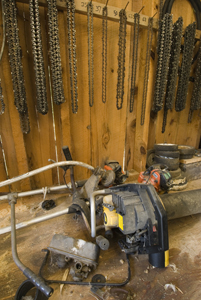 Preparation:
Prior to arrival you'll be sent a full list of equipment and suggested
clothing, as well as your homework assignment. A large amount
of photo gear is NOT required for the course. In fact, I'd rather
you purchase gear after you do the course, so that you'll buy
right based upon your needs.
Preparation:
Prior to arrival you'll be sent a full list of equipment and suggested
clothing, as well as your homework assignment. A large amount
of photo gear is NOT required for the course. In fact, I'd rather
you purchase gear after you do the course, so that you'll buy
right based upon your needs.
Equipment: However, if you need help on buying equipment
for the course, please feel free to call us for our best recommendations.
The course is limited to digital SLR shooters -- since we'll be
discussing TTL flash, using varying focal length lenses, etc.
We feel that point-and-shoot digital camera users would not obtain
sufficient benefit because of the topics we'll be covering. Your
basic equipment should include a DIGITAL SLR 35mm camera, an 80-200
(or 75-300 or similar focal length), some macro capability (either
through close-up lenses, extension tubes, or a true macro lens),
and you might consider some telephoto reach, via a converter or
fixed lens, of 300mm or longer.
An electronic flash is extremely helpful and we'd recommend having
one along. Please call our office if you need advice on models.
However, a tripod is required. We recommend either a Bogan 3021
or 3022 tripod, with a true ballhead, or a Gitzo tripod (your
choice of models) and a ballhead.
Although we will be conducting our Adobe Photoshop exercises on
our computers, it is strongly recommended that you bring your
own laptop (if you have one) to do some of your basic image management.
However, if you do not have a laptop that's OK - you will be using
our computers for all of your work.
Above: Balancing ambient light with flash,
or just taking long exposures in difficult light can be challenging,
but you'll understand how to do both.
Location: The CNPC is based out of our Hoot Hollow Institute,
located on the grounds of our rural home in central Pennsylvania.
Hoot Hollow is mid-state, northwest of Harrisburg, east-south-east
of State College, near RT 522 between Lewistown and Selinsgrove.
The nearest full-service airport and car rental is the Harrisburg
airport.
Lodging is included, at
a farm vacation home, which we have been using since the inception
of our D-CNPC and CNPC courses here at Hoot Hollow. The Farm is
an extremely target rich photo environment filled with interesting
subjects, including Americana, farm animals, tools, and, nearby,
wonderful Pennsylvania scenics. Most breakfastes and all diners
are served at the Farm, and the food is terrific.. Details will
be forwarded to all participants.
All meals are included.
Lunches, usually, are served at Hoot Hollow. The food is delicious.
All refreshments, including snacks, soft drinks, wine, and beer,
are included. Don't plan on dieting that week! Although the objective
of this course is not based around food, you wouldn't know it,
for the meals are terrific and they are always a 'highlight' of
the week, regardless.
Price: The tuition for the DCNPC is $1,595 and includes
all meals from Sunday dinner to Saturday breakfast, lodging (based
upon double occupancy from Sunday to Friday),and instruction.
The fee does not include transportation to or from the course.
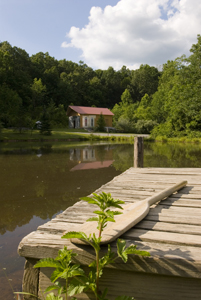
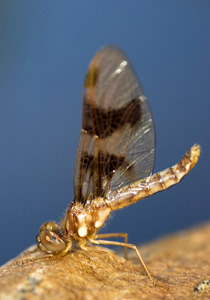
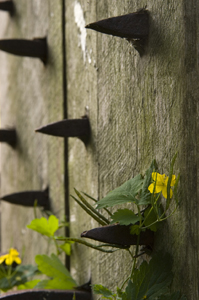
Using a wide-angle effectively can be difficult,
but you'll learn how. Macro subjects with fill flash, vignettes
of a larger scene,
and more are all covered in our lectures on Composition, Lenses,
and TTL Electronic Flash.
What You Will Learn
1. Workflow - Most digital photographers'
image files are chaotic. We'll teach you a meaningful system,
our system, that really works!
2. .Exposure - You will become masters of your photography.
3. TTL Electronic Flash - Flash imagery will no longer disappoint
you.
4. RAW Conversion - You'll understand the
power of RAW and be able to convert images so that little, if
any, Photoshop work is required.
5. File Management via Adobe Bridge
6. Essential Photoshop Skills - You'll learn the tools you need
to know, and you'll understand Layers and Masks - skills often
a part of advanced Photoshop courses but easy to understand if
introduced correctly. Please note, however, that this is not a
Photoshop course - we're just introducing, explaining, and teaching
skills that will allow you to maximize the potential of your digital
images.
7. Maximizing the Digital Potential -- You'll learn how to shoot
and make an exposure composite and a Panorama that comprises 2
images, or 12!
8. . …From Your Shooting. You'll be making photographs all
week - we won't. Except for instructional demonstrations with
our cameras and lenses, we won't be photographing during your
week. Instead, our creative energies will be devoted to helping
you reach your creative potential.
The Workshop Topics
covered in class and afield
Exposure: Recognizing middle-tones; exposing for all
tonalities, gray, black, and white; using your camera on manual
and on spot metering mode; using the sunny rules. You will be
shooting your camera on Manual Mode and on Spot or Center-weighted
metering. For those students who have only used matrix or evaluative
metering on one of the programmed modes (like A, S or Tv, or P)
this is a radical departure but an extremely important step in
mastering photography.
This topic, exposure, is one of the
KEYS to successful shooting, and you will master exposure during
this course! Everyone does! And everyone feels this is one of
the most important aspects of the course and the most satisfying.
We are convinced that we
offer the most complete and thorough treatment on exposure anywhere.
You will learn, and your photography will be changed forever.
In the DIGITAL world, mastering exposure is still important. However,
digital shooters have the added advantage of seeing a histogram
that illustrates the exposure values, and of shooting in RAW format
to further adjust exposure. We'll explain the benefits of each.
We'll explain how a Histogram works; how to do a great
RAW conversion; how to shoot High-Contrast scenes for exposure
composites; and much, much more.
Composition: Finding effective compositions, using lenses
effectively; seeking the best perspective; understanding hyperfocal
distance; knowing zones of sharpness; selective focus; and the
rule of thirds. We approach this topic in several ways, in separate
lectures on composition and on lenses, and through several in-field
exercises where we review work in the field as classroom projects.
In the DIGITAL world, compositions
are less restricted as large variations in exposure can still
be accommodated by taking two or more exposures and compositing
them later. We'll show you how, and you will do, compositions
that incorporate large variations in exposure, as well as Digital
composites that provide wide, panorama view.
Lighting: Using natural light effectively; using diffusers,
reflectors, and mirrors.
Electronic Flash: This is one of the most important
topics in the course, second only to exposure in interest and
popularity. Many photographers avoid using flash because their
images look 'flashed' or artificial. You WILL learn how to balance
ambient light with flash, and the wonderful control you can have
by actually understanding how flash works and when you'll wish
to need it. We'll cover manual and TTL exposures and introduce
you to multiple flash techniques; high speed flash; and remote
flash setups, as a foundation for even further work with flash.
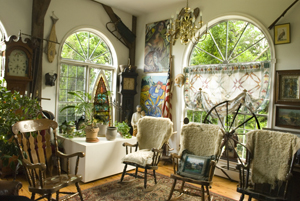 The
Art of Seeing: Many people have the technical aspects of photography
mastered, but lack vision. We'll work on improving your personal
vision and technique.We'll be doing this through traditional photography,
reviewing all the important concepts, but we'll also show you
how you can expand your creative vision through Photoshop. Our
goal is not to have Photoshop correct a poorly made image, but
instead to show you how digital photography can expand your opportunities,
and produce images not impossible to capture before. Real images,
not fake composites, but images that require your 'seeing' the
digital potential before you incorporate Photoshop to produce
your results. Spectacularly EXCITING!
The
Art of Seeing: Many people have the technical aspects of photography
mastered, but lack vision. We'll work on improving your personal
vision and technique.We'll be doing this through traditional photography,
reviewing all the important concepts, but we'll also show you
how you can expand your creative vision through Photoshop. Our
goal is not to have Photoshop correct a poorly made image, but
instead to show you how digital photography can expand your opportunities,
and produce images not impossible to capture before. Real images,
not fake composites, but images that require your 'seeing' the
digital potential before you incorporate Photoshop to produce
your results. Spectacularly EXCITING!
Left: An exposure composite of two images
- one exposed for the window and one for the interior, composited
in Photoshop using Layers and a Layer Mask --you'll learn how
to do this.
Computer Skills: Although this is not an Adobe Photoshop course,
you will be using the computer and using Adobe Photoshop to composite
digital images. Photographers COMPLETELY unfamiliar with a computer
should not attend, but for everyone else we'll get you in there
and started, and you'll learn the basics of how to do great things
with your digital images. Please note, however, that this is a
digital photography course, not an Adobe Photoshop course, so
our treatment of Photoshop will be rather basic and dedicated
to the work at hand -- making composites. The reason for this
is simple: In watching digital photographers for the past two
years I've noticed that most still shoot as they did when they
used film. They're not thinking digitally, and they're not exploiting
the full advantages digital has to offer. You'll be thinking digital
after this course, and you'll have the basic skills to execute
the images that you envision.
Two of the DCNPC's are followed by Adobe Photoshop Courses.
Both the May and June courses are followed by our Introduction to Photoshop,
a beginner's course that covers the basics of Photoshop but truly
advances students to an Intermediate Level. Frankly I wish everyone
would take this Introductory Photoshop course unless they are
convinced they're rather expert and experienced in Photoshop.
Most folks over-rate their skills, have bad habits and misunderstandings,
and are not as proficient as they think they are.
Brain-picking time: As I tell every group, consider
me a bucket of water and yourself as a sponge. It's my sincere
hope, and I make it my goal, to impart everything I know, and
that you need to know, by week's end. Saturday's last session
is devoted exclusively to this objective.
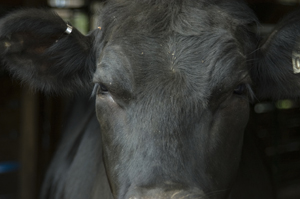
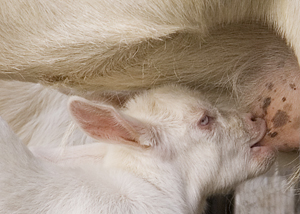
Black subjects and white subjects can fool
your exposure meter, but you'll learn Exposure and how to
meter all subject tonalities correctly.
YOUR COURSE SYLLABUS, in brief....
This syllabus is subject to some change as weather, the group's
progress, or unpredicted photo opportunities cannot be anticipated.
However, for most groups, most times, the following schedule applies:
1st Evening: Registration and check-in at Mountain Dale
Farm. Introductory meeting begins at 5PM, followed by dinner at
6, followed by an orientation digital slide program and, if time
permits, your homework assignment.
Day 1: We'll start immediately
after breakfast where you'll do your first composition/technique
exercise. In this exercise we'll review fine points of 'seeing'
images as well as practicing and illustrating sound camera handling
techniques. After viewing your homework assignment the afternoon
will be devoted to exposure. That afternoon you'll begin your
personal shooting assignment - due Friday. In the evening we'll
begin a review of several participants' personal portfolios and
review material we covered during the day.
Day 2: After an early morning shooting session, we'll
convene for more classroom instruction with a very thorough treatment
of composition. After lunch we'll introduce and explain TTL flash,
and in the late afternoon you'll do a TTL exercise that will reinforce
your understanding of TTL flash. The evening will be devoted to
a program on the effective use of lenses and further reviews of
portfolios.
Weather permitting, you'll also have the opportunity to photograph
wild Flying Squirrels at our feeder after dark.
Day 3: After a sunrise shoot, we'll have a field trip
for more shooting before returning to the Institute for more instruction
in the next exciting phase of your program. We'll begin our introduction
to Digital Workflow after lunch and begin a basic introduction
to Adobe Photoshop and Adobe Bridge as you learn to batch rename
images, edit using Adobe Bridge, and begin your file management
system. In the evening we'll continue with the remaining participant
portfolios.
Day 4: We'll continue with Digital
Workflow as we incorporate your images into the computer, and
you'll learn everything you need to know to make an effective
RAW conversion. In addition to the editing and file management
aspects of your digital photography, you'll also master the RAW
conversion of your images and we'll work on two projects -- shooting
a scene with varying exposure values and shooting a digital panorama.
Computer time will be devoted to instructing you on how to do
these tasks.
Day 5: As a special bonus we'll have an exciting
'Critter Day' morning where you'll have the opportunity to shoot
some of our animal photographic subjects. These vary, but in the
past on various courses we've photographed a running white-tail
deer fawn, raccoon babies, rattlesnakes, tiger cubs, … a
host of special subjects. Afterwards we'll continue with our Photoshop
instruction as it applies to your images, and in the afternoon
we'll help you produce a digital slide show that will incorporate
your work. That evening, after dinner, you'll have the chance
to finalize your images for our final Digital Show and to do a
final shoot of our flying squirrels.

You'll learn how to do a panorama stitch of
landscapes or even wildlife.
Last Day: After breakfast we'll meet at Hoot Hollow
for a digital slide show that will showcase your work from the
week, including images made by compositing or other digital techniques.
Afterwards, there is.Graduation! and a final session where we'll
conclude by answering any and all final questions you have. For
those who wish, you may want to consider taking the Adobe Photoshop
CS2 courses that follow.
The course concludes at 11AM, and participants can easily make
flights scheduled for after 3PM in Harrisburg.
Each evening concludes with an informal social
hour where you're invited to relax, have a beer or a wine or a
soft drink, and share the day and unwind in our meeting room.
A Personal Note ...
If you haven't experienced the infectious joy of nature photography,
you soon will. And you'll discover this rewarding pursuit only
grows more exciting and challenging as your skills increase. And
that's the rub, for to get the most out of your shooting, your
skills should improve. Unfortunately, on many of our tours and
out-of-state workshops we've found participants lacking in the
essential basics of exposure, techniques, procedures, and basic
usage. That being so, we sincerely wish everyone who takes any
of our tours or exotic workshops or safaris would first take the
time to do this course. As you'll discover, it will become the
foundation of your skills, and your future photography will benefit
enormously from doing so.
The above statement is even more relevant, and important, for
digital photographers. While digital photography seems easy, because
of the immediate feedback it provides, an 'easy' image doesn't
necessarily make a good one. Further, digital shooting opens up
a whole new world of opportunity where a photographer is no longer
hampered by scenes with varying ranges of exposure (within limits,
of course!), or by the limitations of a lens's depth of field.
Wide-view images that lose their impact as a wide-angle shot become
dynamic, riveting images when shot as a panorama -- sometimes
by using a telephoto! A whole new world of photography is now
available, one that truly mirrors what our eyes see and not what
our films have been able to capture. Now, we can capture what
we truly see, using digital to capture the world as we see it.
Many have compared our DCNPC to a college-level course offered
in an entire semester, and almost everyone states that they haven't
worked so hard in a very long time, BUT that they enjoyed the
hard work! You will, too, and we promise you that you will learn
quality photography!
Our goal is not simply to present a thorough and enjoyable Digital
Photography Course but, quite sincerely, to offer the most complete,
most rewarding, and simply the best instructional program you
will find, anywhere. Feedback from our participants tell us we've
met that goal; one we intend to continue to meet.
Our
Location
Our Digital Lab is located near McClure,
Mifflin County, an extremely photogenic area of central Pennsylvania,
about 45 miles SE of State College (home of Penn State University)
and 90 minutes NW of Harrisburg, the state capital. All major
airlines serve Harrisburg, where car rentals are available for
anyone flying in for our courses. By car we are about 3 hours
from Philadelphia or Baltimore, 4 hours from New York City or
Pittsburgh. Our location is within a day's drive of much of the
eastern, southeastern, and mid-west states. For example, the North
Carolina border is around 8 hours away, and Indianapolis around
10. If you prefer to drive, rather than fly, we're really not
that far away from much of the eastern US. Leaving the main highways,
as you drive through the rolling farm country or cross over mountain
ridges, one might think we are in the middle of nowhere, but I
can assure you that our Digital Lab is absolutely state of the
art. The scenic possibilities in the area are fantastic. The farm
and our Digital Lab are located in a broad valley framed by Jack's
and Shade Mountains, and within a few minutes one can be filming
within a hemlock forest, or driving along ridge top roads through
miles of deciduous forests, or wandering the country roads through
rolling hills in Amish and 'English' farm country.
Our lab is located on our property where we also conduct our various
nature photography courses in the Hoot Hollow Institute, a separate
building located deeper in our woods. Our property, and the farm
vacation lodge where our participants stay are both target rich
environments for photographers. Our property is a mix of flower
gardens, wild fields, streams, ponds, and forest; the home to
flying squirrels, bluebirds, goldfinches, treefrogs, and more.
We've recorded 100 species of birds on our property and virtually
every species of nonvenomous reptile and amphibian recorded in
central Pennsylvania, as well as most mammal species. It's not
unusual to see six or more species of mammal in a single day.
In summer there are a variety of insects, including swallowtail
and tiger butterflies, and in spring and fall the foliage change
(the green wave of spring, the vibrant reds of autumn) makes for
dramatic images. The location and landscaping is perfect for breakout
sessions and for shooting images that you may wish to incorporate
into your digital imagery.
The Mountain Dale Farm is a working farm, with chickens, horses,
dairy cows, cats, dogs, peacocks, and more. It is a farm filled
with 'Americana,' antiques, statues, old wagons, etc., etc. --
filled with potential images. The countryside around the farm,
with rolling hills overlooking farm fields and barns, as well
as the deciduous forest surrounding the farm, offers the potential
for forest, fern, fungi, and macro images.
Participants stay at the Mountain Dale Farm, a farm-vacation facility
similar to a bed and breakfast. Breakfasts and dinners are served
at the farm where our participants eat AS A GROUP family-style.
Lunches are served here at Hoot Hollow (the name of our property).
We feel this aspect of our course is unique and special -- people
traveling alone are not alone once they arrive, and the time spent
together as a group provides participants with the opportunity
to share information, have fun, and build friendships. One warning,
however! The meals both at the farm and at Hoot Hollow are tasty
and filling and we cater to special diets as needed, so don't
expect to go hungry during your stay! You will not lose weight!
One of the advantages, we feel, that we offer is simply the fact
that everything is self-contained and included -- all meals, drinks,
etc., both at the Digital Institute and also where you spend the
night at the Mountain Dale Farm.
A special treat is our 'Happy Hour' that wraps up each evening
where the group has a chance to relax, have a beer or a wine or
a soft drink and a snack, and We feel that the camaraderie and
'family' that developed from sharing meals is an important aspect
of the entire experience. Students get a chance to unwind, of
course, but to also ask questions and discuss PS or photography
outside of class.
Our
Lab
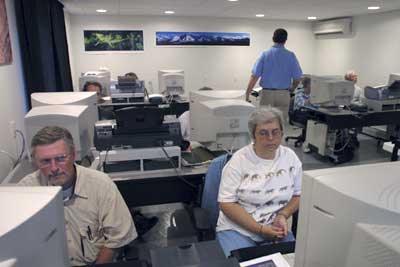 Our
lab is set up with PC/Windows computers equipped with 1 gig of
RAM, 120 gig of Hard Drive, Pentium 4 processors, 19" flat
screen CRT monitors, all networked together with a server where
images can be downloaded, uploaded, and shared. Each student has
a memory card reader and shares a printer. Epson and Canon have
both supplied printers (Epson 1280s and Canon S9000s) that allow
students to see the color differences, speeds, and quality both
deliver. A large printer will be incorporated into the lab in
2004.
Our
lab is set up with PC/Windows computers equipped with 1 gig of
RAM, 120 gig of Hard Drive, Pentium 4 processors, 19" flat
screen CRT monitors, all networked together with a server where
images can be downloaded, uploaded, and shared. Each student has
a memory card reader and shares a printer. Epson and Canon have
both supplied printers (Epson 1280s and Canon S9000s) that allow
students to see the color differences, speeds, and quality both
deliver. A large printer will be incorporated into the lab in
2004.
Our Digital Lab hours and class time
generally begin at 9AM and continue until around noon when we
break for lunch. Our classes resume after lunch and continue until
approximately 5PM or later. Dinner is served at 6PM, and students
return to the Lab by 7:30PM for an optional lab session. Our instructors
are present throughout the day and evening sessions. During the
day the formal teaching is done, with two assistants present to
assist with the teaching and with helping students. In the evening,
the instructors are present and available for helping the students
as they work on personal projects, applying what they've learned
in class. On some evenings, additional instruction and classroom
sessions are conducted if the need arises.
Our lab is designed for NINE students
with, of course, each student having his or her own computer.
Each course has either one primary instructor or a dual instructor
for a team-teaching approach, with a third instructor (usually
me, Joe) as an additional assistant. Our instructors are on-site
and available both during the day when most formal teaching is
conducted and in the evening when students generally practice
their skills.
Unless noted specifically in a particular
brochure, your time at the Digital Institute is spent at the computer.
For some courses there are short breaks or shooting sessions where
students work on making images for a composite or a portrait,
but most of your time is spent in the computer lab. Some additional
courses are offered that involve more time afield in shooting
digital images, but those courses are clearly noted. For the most
part, expect to spend quality computer time while you are at our
courses.
About
Your Instructors
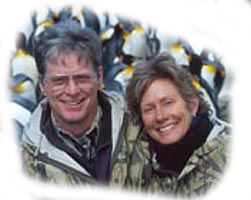 Joe
McDonald has been a full-time
professional wildlife and nature photographer since 1983. He is
the author of six books on wildlife photography and another on
African Wildlife, as well as a how-to video produced with his
wife, Mary Ann, on Photographing on Safari. His work has appeared
in every major nature and wildlife publication published in North
America. Along with operating their own stock photography business,
Joe is represented by over a dozen stock photo agencies worldwide,
including Corbis, Animals Animals, Auscape, Okapia, and others.
Joe
McDonald has been a full-time
professional wildlife and nature photographer since 1983. He is
the author of six books on wildlife photography and another on
African Wildlife, as well as a how-to video produced with his
wife, Mary Ann, on Photographing on Safari. His work has appeared
in every major nature and wildlife publication published in North
America. Along with operating their own stock photography business,
Joe is represented by over a dozen stock photo agencies worldwide,
including Corbis, Animals Animals, Auscape, Okapia, and others.
In addition to maintaining an active and informative website,
www.hoothollow.com, Joe is a columnist for OUTDOOR PHOTOGRAPHER,
writing the 'Focus on Big Game' column, and Joe and his wife Mary
Ann write a photography column for Joe Van Os's web magazine,
www.photosafaris.com on wildlife and nature photography.
For over eighteen years Joe and Mary Ann have been teaching photography
courses and leading photography tours and workshops. Their very
popular photo tours and safaris have them afield for over twenty-five
weeks each year.
Joe has worked with Photoshop for several years, mainly for creating
sales promotional material and for web site use. Now, with the
advent of digital cameras, he is using Photoshop nearly daily.
He is a member of the National Association of Photoshop Professionals.
Mary Ann McDonald, who runs the business
end of the Digital Institute as well as thefood-kitchen-cooking
team, has been a full-time professional photographer since 1990.
Mary is the author of 29 children's books on natural history,
including titles on Leopards, Flying Squirrels, Jupiter, Horses,
Mosquitoes, and other diverse topics. Her work has appeared in
many of the major nature and wildlife publications in North America
and is represented by several stock agencies worldwide, including
Corbis and the BBC Natural History Archives. Mary Ann has been
honored by winning in the Nature's Best Photo Competition and
has won several times in the prestigious BBC Wildlife Photographer
of the Year Competition. In 1994, she won two first places, the
only time for a woman to accomplish this in the history of the
competition and in 2005, both Joe and Mary Ann were selected as
winners, the first time a husband and wife team have separately
won in the competition in the same year.
Digital Nature Photography: From Capture
to Output
Joe and Mary Ann have recently co-authored
a book along with Rick Holt, one of their digital Photoshop instructors.
The book "Digital Nature Photography: From Capture to Output"
is one of the best books out there for encompassing the basic
techniques of digital photography as well as the basic Photoshop
techniques required to enhance your nature and wildlife images.
One of the most exciting sections covers Digital Workflow, the
foundation for all of your digital shooting. This .pdf book is
'The Ultimate Laptop Field Guide' but also has a print-ready version
included for those who want a hard copy of the book. This is the
perfect accompaniment for this course.
Our Educational Commitment - a note from Joe McDonald
If you've read the above biographies, you'll
see that we are dedicated photographers that are interested in
sharing our knowledge and helping people. I've been involved in
teaching my entire adult life, from teaching assistantships in
graduate school to a six-year stint as a high school biology teacher
before starting my career as a wildlife photographer and photo
workshop instructor. In this role I've been a full-time professional
photographer and instructor since 1983.
Our goal is simple - to offer the most complete,
thorough, and rewarding learning experience available, in terms
of the knowledge you'll gain, the quality of the experience you'll
have, the intensity, and, just as importantly, the amiability
and fun you'll experience.
Contact us by e-mail.
info@hoothollow.com
Phone or FAX us at: (717) 543-6423.
 For
the last eighteen years we have been offering THE COMPLETE NATURE
PHOTO COURSE here at Hoot Hollow.
And for the last four years, those courses have been digital-based.
The digital world is upon us and we are excited about the photographic
possibilities this provides.
For
the last eighteen years we have been offering THE COMPLETE NATURE
PHOTO COURSE here at Hoot Hollow.
And for the last four years, those courses have been digital-based.
The digital world is upon us and we are excited about the photographic
possibilities this provides. Preparation:
Prior to arrival you'll be sent a full list of equipment and suggested
clothing, as well as your homework assignment. A large amount
of photo gear is NOT required for the course. In fact, I'd rather
you purchase gear after you do the course, so that you'll buy
right based upon your needs.
Preparation:
Prior to arrival you'll be sent a full list of equipment and suggested
clothing, as well as your homework assignment. A large amount
of photo gear is NOT required for the course. In fact, I'd rather
you purchase gear after you do the course, so that you'll buy
right based upon your needs.


 The
Art of Seeing: Many people have the technical aspects of photography
mastered, but lack vision. We'll work on improving your personal
vision and technique.We'll be doing this through traditional photography,
reviewing all the important concepts, but we'll also show you
how you can expand your creative vision through Photoshop. Our
goal is not to have Photoshop correct a poorly made image, but
instead to show you how digital photography can expand your opportunities,
and produce images not impossible to capture before. Real images,
not fake composites, but images that require your 'seeing' the
digital potential before you incorporate Photoshop to produce
your results. Spectacularly EXCITING!
The
Art of Seeing: Many people have the technical aspects of photography
mastered, but lack vision. We'll work on improving your personal
vision and technique.We'll be doing this through traditional photography,
reviewing all the important concepts, but we'll also show you
how you can expand your creative vision through Photoshop. Our
goal is not to have Photoshop correct a poorly made image, but
instead to show you how digital photography can expand your opportunities,
and produce images not impossible to capture before. Real images,
not fake composites, but images that require your 'seeing' the
digital potential before you incorporate Photoshop to produce
your results. Spectacularly EXCITING!


 Our
lab is set up with PC/Windows computers equipped with 1 gig of
RAM, 120 gig of Hard Drive, Pentium 4 processors, 19" flat
screen CRT monitors, all networked together with a server where
images can be downloaded, uploaded, and shared. Each student has
a memory card reader and shares a printer. Epson and Canon have
both supplied printers (Epson 1280s and Canon S9000s) that allow
students to see the color differences, speeds, and quality both
deliver. A large printer will be incorporated into the lab in
2004.
Our
lab is set up with PC/Windows computers equipped with 1 gig of
RAM, 120 gig of Hard Drive, Pentium 4 processors, 19" flat
screen CRT monitors, all networked together with a server where
images can be downloaded, uploaded, and shared. Each student has
a memory card reader and shares a printer. Epson and Canon have
both supplied printers (Epson 1280s and Canon S9000s) that allow
students to see the color differences, speeds, and quality both
deliver. A large printer will be incorporated into the lab in
2004. Joe
McDonald has been a full-time
professional wildlife and nature photographer since 1983. He is
the author of six books on wildlife photography and another on
African Wildlife, as well as a how-to video produced with his
wife, Mary Ann, on Photographing on Safari. His work has appeared
in every major nature and wildlife publication published in North
America. Along with operating their own stock photography business,
Joe is represented by over a dozen stock photo agencies worldwide,
including Corbis, Animals Animals, Auscape, Okapia, and others.
Joe
McDonald has been a full-time
professional wildlife and nature photographer since 1983. He is
the author of six books on wildlife photography and another on
African Wildlife, as well as a how-to video produced with his
wife, Mary Ann, on Photographing on Safari. His work has appeared
in every major nature and wildlife publication published in North
America. Along with operating their own stock photography business,
Joe is represented by over a dozen stock photo agencies worldwide,
including Corbis, Animals Animals, Auscape, Okapia, and others.